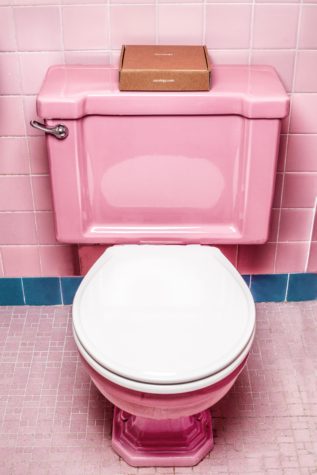
If you stand around an airport bathroom a little longer than necessary, you may witness a few steps toward the fall of human civilization. Because nobody, and I mean nobody, washes their hands well enough to kill off the funk we humans pick up and carry around.
I did this experiment on a recent trip. At the Albuquerque Airport I watched 8 different women as they exited a toilet stall and headed for the sinks. One of them simply fixed her hair in the mirror and left. Three others gestured at a wash–running their hands under the faucet for about a second before flicking away the water; two of those grabbed a towel from the thankfully automatic roll, the other used her sweatshirt to dry off. Four ladies actually used a squirt of soap, but the longest “scrub” was about five seconds long, and only two of the women actually rubbed the soap over their whole hands, not just the palm sides.
If you dare to poke around the Web reading studies and confessions, you’ll learn that lots of people don’t wash their hands after relieving themselves. Almost everyone says they do, but lots of people lie. Men seem to be the worst offenders. One survey of 100,000 people, by a washroom services company, concluded that 62 percent of men never bother to wash off—even though, from what I know of the human male, genitals are typically handled during the deed.
If the CDC had its druthers, we’d all be scrubbing our hands vigorously, with soap, for 15-20 seconds before rinsing and drying, every time we use the toilet. Try doing that. Count out loud. Even 10 seconds is a long time. Twenty feels truly excessive. It seems like a waste of water. But apparently, it’s the right amount of time. (Someone recommended singing the Happy Birthday song–to yourself, preferably–as a decent time gauge.) Where there’s no soap, a good hand-to-hand rub under water can still be effective. In fact, sometimes the soap (or, more often, the dispenser—especially the public-restroom refillable type) is just as disgusting as we are; you may end up with more bacteria on your hands after washing than before.
Being truly sanitary is hard. We humans generate filth: One gram of our feces (a paperclip’s weight) may hold a trillion germs. Very bad things are spread by poop, like Hepatitis, typhoid fever, cholera, norovirus, polio, E. coli, tape worms, Giardia, rotavirus, salmonella. You get the picture.
And while most of us try hard not to get it on our hands, shit happens. As do sneezes, coughs, and other germy bodily outbursts, while we’re at it. We may also try to avoid rest-stop bathrooms, but sometimes one has no choice. Now there’s a petri dish of a room, with contributions from all of the above. If you were to swab in the loo behind the Sunoco you might turn up strep and staph, E. coli and Shigella, plus Hepatitis A, the common cold virus, and even the bugs that cause STDs like gonorrhea and chlamydia. Think about THAT next time you hover over a toilet seat in the sketchy McDonald’s (which is great for the quads, at least). Your feet are still on the floor, no? Dang it.
 On a happy note, the commode itself is pretty lousy at spreading germs; nobody really gets an STD from a toilet seat. But a vigorous flush can fling microbes around, so it’s best to exit the stall ASAP to avoid their landing on you. (Those overzealous automatic toilets that flush while you’re still on them? There’s spatter. Eww.) Even at home, let flop the lid.
On a happy note, the commode itself is pretty lousy at spreading germs; nobody really gets an STD from a toilet seat. But a vigorous flush can fling microbes around, so it’s best to exit the stall ASAP to avoid their landing on you. (Those overzealous automatic toilets that flush while you’re still on them? There’s spatter. Eww.) Even at home, let flop the lid.
Who can say: Maybe the latest craze of chugging sunlight through your back end would do a little disinfecting after such a flushing incident?
(Oh my god, I have to stop scrolling through my Facebook “news” feed.)
Not-quite-clean hands under the hand dryer can also send up a germ tornado. Meanwhile, the sink, particularly the handles, can be funky–as we turn on the faucet with dirty hands. I totally get why some people then use an elbow or a paper towel to turn it off. Not so OCD after all.
You know what else may carry poop germs? The grocery cart handle. The doorknob. Your cellphone. (Remember that Anderson Cooper video?) Your shoes. The inside of your washing machine and even newly washed and freshly tumbled underwear. The stuff gets around and stays.
Most of what’s in it, thankfully, is harmless. Still, just knowing the ubiquity of feces (and other germicans, my new term that you are welcome to adopt) in our everyday lives should be enough to give us pause at the sink the next time we are tempted to do a half-assed rinse-and-flick. Today might be the day to invest in your health, and everyone else’s: Lather for 13, 14, 15…or more. Rinse. Maybe even repeat. Try hard not to pick up new germs in the drying process.
And then, I’d consider using your paper towel if you must grab the door handle, or using a foot or hip to exit if you can. And when you get home? For the love of God, take off those disgusting shoes and leave them outside. This isn’t a barn.
—-
Photos from UNSPLASH
Here’s an interesting experiment: keep track of everything you touch on your way from the stall to the sink. This starts with your own clothing…
And yes, please close the lid. Didn’t RadioLab have an episode years ago about how much gets turned into aerosol by a flush? We’re *breathing* that. It lands on our clothing. Ugh.
It’s a good thing our immune systems are so robust.
Nice article! Though it might be nice to counter some of the panic likely to be felt after reading the above by including a bit of info about our amazing immune system and its ability to fight off many of these germs—indeed, isn’t it important we are exposed to some of these germs when we are young? That said, I have always wondered about paper, namely, books. Do book pages hold germs from previous page-turning fingers? Maybe you could write about this in the future. Are libraries simply a huge breeding ground for nasty diseases, after all?
Hi Adam! Paper books may be less likely to be germ repositories than latrines. Couple of years ago, at New Scientist, I edited an article about how clean we should be. https://www.newscientist.com/round-up/clean-hygiene-your-health/
One of the things we looked into was the veracity of the “5-second rule”. And what do you know, someone had done a study! They found that the number of germs that stick to things depends on the surface holding the germs. Carpet and similar surfaces absorb more bacteria than hardwood floors, so less will transfer to you. Having seen the crags and threads of paper under a microscope, I can’t tell you if paper shares more relevant factors with hardwood floors than carpet and other fibrous stuff.
However, I can tell you that anything wet or sticky is more likely to transfer bacteria, which makes it less likely to get a big bacteria load from a dry book than a moist latrine – so I guess the lesson is, don’t have wet or sticky hands while you’re thumbing through a borrowed book.
On reflection, that seems like a pretty good rule generally.